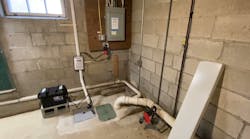It's good to see that some of you rarely encounter electrical disasters, but the experiences of the other 84% of you should be enough to give everyone in the industry pause. Got an idea how to fix the problem?
We asked you for some of your ideas on why you think you frequently encounter these kinds of installations. The following are some of our favorites.
To the point
I am not great with the long speeches, so I will keep this short. Lack of training, card-carrying electricians, and decent pay and respect for those who take the time to gain the skills needed contribute to the problem. The electrical industry used to be a respected trade, but now most levels of electricians are treated with about the same respect as a drywall man.
S.J. Flippo
Just enough to get by
I am a Master Electrician, Licensed Block & Associates/Experior. I have been involved in the industry for upwards of 30 years. The biggest problem I see here in the Midwest is that the majority of electrical contractors just do not care about the seriousness of our trusted trade. The Code is mostly looked at as a high and lofty standard that is impractical and too costly to operate by. Consequently, the majority of the installations I have looked at are undersized, underwired, and in many instances improperly protected. Most, if not all, of the exceptions allowed in the Code are always used with little regard for efficiency or future expansion. Multiple short-cuts are always taken, and unfortunately, the inspector, if one is required in the area, does not see the shortcomings due to inadequate training and time constraints with the inspections. Most of the jobs I have been called out to, whether residential, commercial, or industrial, have many blatent Code violations.
The NEC is the national standard for installation safety, but it is up to the local authority to choose to enforce part or all of the Code in one area, and that's one breakdown in the system.
Contractors who have been in business for any number of years have the attitude that there is nothing new and that they are just doing what they have always done because that is the way they were trained by their predecessors. Tom Henry said it best: There are many installing electricians and very few real electricians.
In our area there are no requirements for continuing education for continued licensing. Many electricians were grandfathered in with licensing and have no real training. I continue to research the Web, manufacturers' sites, and read all trade magazines, etc. I believe that we, as electricians, are not just involved in a trade, but also hold a public trust, and in that we are ultimately responsible for staying abreast of all pertinent standards. We hold a duty to our clients to provide service and installations that at the very least meet all Code requirements but should generally exceed them to provide our clients with more that engineered "boiler-plate" plans and installations.
Michael Draggett
A multi-faceted problem
This is a complicated area to address because there are varing factors to consider. The first thing we need to do is make it more difficult to become an electrician by improving the standards in which we become electricians. The reason I say this is because the standards for apprentices vary greatly. Being able to pass the test and being a good electrician vary as well. The second thing we need to do is make the punishment for Code vilolations more severe and enforceable to home owners as well. This will improve installations by both electricians and home owners. Now the enforcement of these Code violations must become more severe to business owners. This would make this a higher priority to businesses and safer to the public. This would also make it a higher level of priority on the construction site. The most inportant thing to do is to educate the public on the safty hazard of electricity. This does not mean educate the general public to a knowledge level to make them think they are safe around electricity and electricians are not important. I think the building trades need to improve the image of the trade so the enforcement of building codes and plumbing codes should be enforced everywhere as the electricial industry is. I would be happy to help in this improvement of safety in the industry.
Conrad Schmid
An exercise in futility
It's practically impossible. I do primarily residential work. The do-it-yourselfers are responsible for lots of faulty work. Many of them think they know better than trained electrical professionals, especially the ones with engineering degrees. Then there are the carpenters who think they know how to do some basic wiring but they make a mess of it. Some general contractors also think they know it all and do a good job of botching it. The list goes on indefinitely and includes sloppy so-called electricians as well. Until we can limit the purchase of electrical supplies to qualified people, the shoddy work will continue, and unfortunately, that's not about to happen soon.
Rob Krensky




